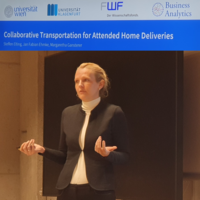Attended Home Deliveries (AHDs) are characterized by dynamic customer acceptance and narrow customer-specific delivery time windows. Both impede efficient routing and thus make AHDs very costly. In this paper, we explore how established horizontal collaborative transportation planning methods can be adapted to render AHDs more efficient. The general idea is to enable request reallocation between multiple collaborating carriers after the order capture phase. We use an auction-based framework that allows participating carriers to buy and sell delivery requests without full disclosure of business information. We extend this framework for AHD specifics such as the dynamic arrival of customer requests and information about delivery time windows. Using realistic instances based on the city of Vienna, we quantify the collaboration savings by solving the underlying routing and auction problems. We show that narrow time windows can lower the savings obtainable by the combinatorial auction by up to 15%. Therefore, we suggest enhancing the decision processes of request selection and request bundling using information about delivery time windows. Our findings demonstrate that methods for request selection and bundle generation, that work well when no time windows are imposed, can lower savings considerably, if they are applied in settings with narrow time windows.
This is joint work with Steffen Elting and Jan Fabian Ehmke.
